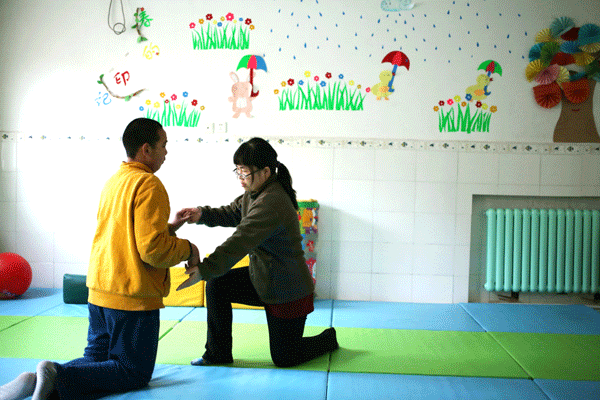The new sexual revolution
Updated: 2014-12-03 07:54
By Yang Wanli(China Daily)
|
||||||||
On a winter afternoon in Beijing, two late-teenage women were climbing the sunlit stairs of an old six-story apartment block in the Xicheng district, when their progress was brought to an abrupt halt by the sight of a young man standing in the shadows, completely absorbed in the act of masturbation.
The girls shrieked and fled the scene, then they called the police to report "the pervert". However, the story ended not with a prosecution, but with the arrival of two tearful and despondent parents who had been called to collect their mentally disabled, 18-year-old son.
"He was diagnosed with severe mental disabilities at the age of 4. Although it's hard to raise a disabled child, his polite manner and tender nature are a comfort to us," said the young man's mother, who preferred not to be named.
Despite their son's condition, the family's life had been relatively normal until recently, when the young man developed a compulsion to masturbate whenever and wherever the urge overtook him. "We don't know how to help him or even how to make him understand that he shouldn't do that in public. It always hurt when people jeered at my son and called him 'the fool', but now we feel even worse and are worried they may start calling him 'the flasher'," the mother said.
The latest statistics from the China Disabled Person's Federation show that by the end of 2010, there were more than 85 million people with disabilities in the country. Mental and emotional disabilities accounted for 20 percent, while more than 25 percent had physical disabilities, and the remainder had impaired hearing or speech, or multiple disabilities.
The government has been working to provide more educational opportunities for the disabled, and by December 2012, nearly 72 percent of disabled children had access to compulsory education, a rise of 10 percent from 2008, according to figures from the Ministry of Education.
However, there have been fewer developments with regard to sexuality and disabilities, especially among people with mental or emotional impairments such as autism, or those whose problems result in diminished intellectual ability.
"Many people believe that disabled people have no sexual desires, or believe that their sex lives will almost certainly result in trouble, such as unplanned pregnancies," said Cai Cong, a visually impaired man who works for One Plus One, a disabled culture development center in Beijing.
According to Cai, some parents will resort to desperate measures to avoid unplanned pregnancies, such as authorizing the removal of their daughter's uterus, a practice that is supported by some teachers at special education schools. "When we discuss their (disabled people's) rights to have sex, get married, or even have children, the most common question people ask is: Isn't it enough for a family to have one abnormal child?" Cai said.
Embarrassing behavior
Despite her four years as a teacher at Lizhi Disabled Person's Rehabilitation Center, Xu Yulu was still embarrassed when she discussed the time she discovered a male student masturbating in a dormitory.
"It happens a lot and usually there's more than one student involved, but I know this is normal in the physical development of disabled people," the 28-year-old said.
The center, which is located in an old kindergarten building in the Fengtai district of Beijing, started providing services to emotionally and mentally impaired people aged 15 and older in 2008. There are now 81 students, and in addition to teaching basic life and communication skills, the center also provides students with opportunities to take part-time jobs outside.
"Sex education for people with disabilities is a new topic in China, and it has attracted attention from both parents and the public during the past couple of years," Yang Chao, deputy director of the center, said. "We have often noticed intimate acts between male and female students, such as holding hands, touching each other's bodies, or kissing. Sometimes this also happens between students of the same gender."
Yang said he had noticed that two or three male students used to lie on the same bed at night and touch each other's genitals. "It sounds strange, but once you realize that they do it because they have no awareness of sexuality, you can't label it 'disgusting' or 'evil'," he said.
Yang and Xu both spent four years at college majoring in special education. They said there were no lectures about sex education for the disabled, and none of their professors were conducting related research. Yang and Xu learned all they know about the subject from seminars or workshops organized by NGOs and foreign research institutes.
"People who are emotionally and mentally impaired know sadness, happiness, and shame. They are physically healthy and have sexual impulses. The key is how to teach them to express their sexuality in appropriate ways, rather than depriving them of the right to express or enjoy it," Yang said.
"We can't reproach them with harsh words simply because they follow human nature. Harsh words will only scare them," he said, adding that a 17-year-old female student once asked if she could be his girlfriend. "We usually explain 'love' as a broader concept, which is not just between a man and woman, but also exists in families and between students and teachers."
The center provides regular workshops with students to discuss the basic facts of gender differences. The teachers pay attention to the intimate activity between students and describe those activities in the workshop, but without naming names.
"The interesting thing is that many students know that such activities are sensitive. The teachers tell them that these things are not wrong, but they need to be done at home without other people around," Yang said.
So far, the center has trained more than 600 students, and about 20 have married. Some are now parents themselves.
In his six years at the center, Yang has only encountered one case that was beyond his abilities - a 50-year-old intellectually impaired man, who was not only too old to learn about a well-regulated life and basic social principles, but also had a highly developed, uncontrollable, sex drive.
"We even considered finding a sex worker for him because we couldn't allow the other students to be at risk of sexual harassment from him. But sex workers are prohibited in China and there were no other options, so finally we had to expel him."
- Disability issues actively pushed by China at ASEM
- Disability no barrier to can-do spirit
- Disability and discrimination
- China founds disability prevention center
- Miracle survivor receives 'light' disability grade
- Disability rights advocates call for equal employment
- My response to readers on matters regarding sex and sexuality
- Relationships: Questions over son's sexuality
- Sexuality is just a part of who we are

 China, South Africa sign economic pacts
China, South Africa sign economic pacts
 Across America over the week (Nov 28- Dec 4)
Across America over the week (Nov 28- Dec 4)
 US official praises China's role in counter-piracy
US official praises China's role in counter-piracy
 Film takes on Chinese stereotypes in US
Film takes on Chinese stereotypes in US
 World news pictures of the year 2014
World news pictures of the year 2014
 Texas tries to lasso China
Texas tries to lasso China
 Obamas usher in Xmas with lighting of national tree
Obamas usher in Xmas with lighting of national tree
 Family of nine struggles to survive
Family of nine struggles to survive
Most Viewed
Editor's Picks

|

|

|

|

|

|
Today's Top News
China, South Africa sign economic pacts
Zhou Yongkang expelled from CPC
Zhou Yongkang arrested, put under judicial probe
US hospital looks to China for more medical tourists
Intel to invest $1.6b in Chengdu plant
China eyes Paris climate pact
Major general netted in anti-graft campaign
Xi vows military boost
US Weekly

|

|








